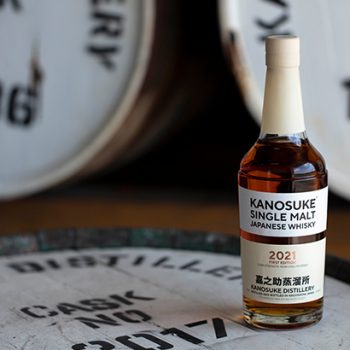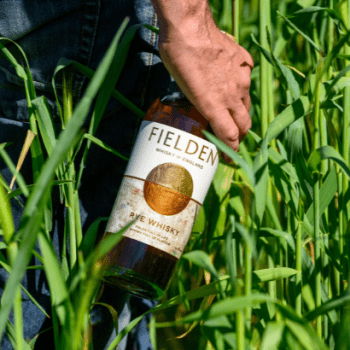Distill Ventures: Mexican whisky ‘one to watch’
As demand for the world whisky category continues to strengthen, Frank Lampen and Charlie Steel of investment firm Distill Ventures tell The Spirits Business how distilleries are forging their own styles and creating connections with a new generation of consumers.

Founded in 2013, London-headquartered spirits accelerator Distill Ventures says it is committed to developing innovation in whisky by helping startups and established drinks brands to scale through funding, networking, expertise and partnering.
Distill Ventures boasts a world whisky portfolio that currently comprises Australia’s Starward whisky, Danish distillery Stauning, and English whisky brand Fielden (formerly The Oxford Artisanal Distillery). Furthermore, American whiskey brand Westward and Japanese single malt Kanosuke are also under the company’s ward.

Distill Ventures founder Frank Lampen says while the growth of the new world whisky sector has been driven by consumer interest in new markets, the category’s growing popularity can be attributed more to producers turning to new takes on traditional whisky making, which in turn is resulting in unique flavours.
One such brand seeing success from this is Danish distillery Stauning, which Lampen says has captured the attention of US consumers by “bringing something new to the rye whisky category”.
“There are lots of super interesting rye whiskies coming to the market, and a lot of them coming from Europe.” Lampen notes that rye whiskies are typically spicier on the palate, with some expressions described as spiky, however Stauning’s production process, which involves floor malting the grains and using smaller stills, creates a “more refined rye whisky” that includes cask-finished expressions considered more suitable to consumers looking for something “more elegant” when compared with the more traditional American flavours of rye.
While not considered a ‘new world’ category, Japanese whisky is also benefitting from the emergence of more craft distilleries that are bringing new techniques to the whisky-making process.
Kanosuke Distillery, Lampen says, has applied new techniques to its whisky making, which has given consumers something new to engage with in the sector.
“Japanese whisky has had a phenomenal run over the last 15 years, with some of the traditional producers, like the Suntory brands, having been around for more than 100 years, but now you have this new wave of distilleries coming to market, which are giving consumers something really new and interesting to engage with. Kanosuke, for example, is bringing new techniques to the whisky making tradition,” Lampen says.

The Kanosuke Distillery actively uses procedures and technologies cultivated in shochu production. Its Hioki Japanese Pot Still Grain whisky, for example, employs a stainless steel pot still and vacuum distillation as used in shochu production. These techniques create a whisky that is described as richer and mellower than a ‘typical’ Japanese whisky, which in turn has enabled the brand to find a new audience.
Regions to watch
Distill Ventures defines the new world category on its website as whiskies not produced in Scotland, Ireland, Canada, the US or Japan, or a whisky made in a style not traditionally associated with the country it is made in. With this in mind, the potential for the new world whisky category is almost endless, however Lampen advises that certain regions and markets are worth watching more so than others, with France being of particular interest given its track record of creating successful spirits, such as Cognac and brandy, and the demand for the spirit among French consumers.
Beyond Japan, other Asian countires are also producing interesting and award-winning whiskies that Lampen says are worth keeping an eye on. The success of Taiwanese whisky brand Kavalan, for example, indicates there is an opportunity to explore other non-traditional whisky-producing regions on the continent that may be able to leverage their unique local ingredients and production methods.
Furthermore, with the rise of Korean cultural influence globally, from K-pop to Korean cuisine, Lampen suggests that Korean whisky brands, such as South Korea’s Three Societies Distillery, could potentially gain significant traction and interest from consumers.
However, it is the emerging Mexican whisky market that Lampen believes could soon be making waves throughout the industry, thanks to its ability to leverage the success and traditions of other Mexican spirits such as Tequila and mezcal. Lampen notes that given that the majority of whisky consumed globally is made from non-traditional grains such as corn – a staple of Mexican cuisine – there may be an opportunity for Mexican whisky to appeal to consumers looking for something different from the traditional Scottish-style whiskies.
Furthermore, the cultural influence and popularity of Mexican food, spirits, and overall heritage could help Mexican whisky brands gain traction and exposure in the global market.
Converting consumers
According to a 2023 report from IWSR Drinks Market Analysis, the global whisky category grew by 8% from 2021-2022, with figures showing that the premium end of the market has been the key driver.

With most new world producers positioning themselves at the premium-and-above segment, many brands in the category are finding an enthusiastic audience. However, optimising marketing and bringing exciting products to market is crucial for brands if they want to get consumers adding bottles to their baskets, according to Lampen.
“[Since Covid] consumers are much more careful with their money. We are seeing that people’s frequency of buying is a bit less, so we have to work harder to secure that spot in a consumer’s basket,” he notes.
“Our focus [at Distill Ventures] is working with our companies to make sure that they use the [investment] money to really optimise their marketing, sales structure, and keep on bringing really exciting products to market.”
Charlie Steel, Distill Ventures’ whisky portfolio director – rest of the world, also notes that the on-trade sector plays a pivotal role in driving consumer awareness, trial and adoption of the new world whisky category as a whole, as more consumers are now being exposed to and recommended whiskies originating from different, non-traditional roots and production methods, rather than the standard offerings.

“If you look at what spirits or brands a bartender recommends for you now, it is completely different to what it would have been 10 years ago, and I think that is really indicative of the strength of the movement that’s happening with new world whiskies,” says Steel.
Many of the new whisky brands in Distill Ventures’ portfolio have seen great success, which has been largely driven by the appetite and appreciation from the on-trade sector for these unique and differentiated products. Fielden Whisky of England, Steel notes, has “absolutely killed it in the top-end on-trade in London” since it launched in May, “and that’s in large part led by the appetite that that sector of the on-trade has for these new brands”.
Steel says this shift in bartender and on-trade recommendations is the most exciting aspect of the new world whisky category, as it is driving consumer interest and willingness to try something new and different. As such, the on-trade sector remains critical for building credibility, generating consumer interest, and exposing people to these new and innovative whisky brands.
Related news
New bottlings for World Whisky Day
